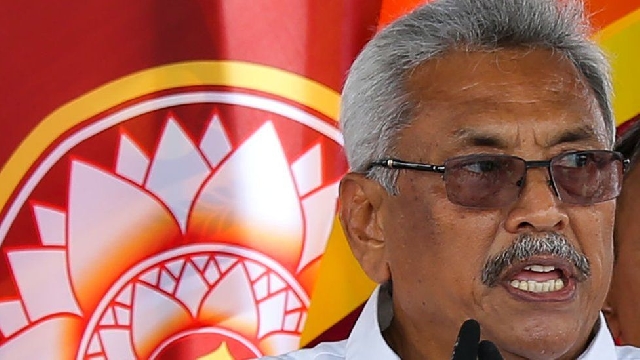Sri Lanka president resigns after fleeing
 President Gotabaya Rajapaksa defied calls for his resignation for months but has now fled
President Gotabaya Rajapaksa defied calls for his resignation for months but has now fled
Gotabaya Rajapaksa has resigned as president of Sri Lanka after fleeing to Singapore in the face of mass protests at home over his rule.
He is believed to have wanted to leave Sri Lanka before stepping down in order to avoid the possibility of arrest under a new administration.
The cost of food, fuel and other basic supplies has soared for Sri Lankans.
In the capital Colombo, delighted demonstrators greeted news of the president's departure with dancing.
"We are beyond happy but also beyond relieved so we can take a break and go back to our lives," Viraga Perera told the BBC.
"At this stage, we are so exhausted because of all the flip-flopping, that we consider this moment substantial enough as a victory."
Mr Rajapaksa arrived in Singapore earlier on Thursday after first flying to the Maldives on Tuesday night. Reports say he is accompanied by his wife and two bodyguards.
Singapore's foreign ministry said Mr Rajapaksa had not asked for asylum or been granted asylum. "Singapore generally does not grant requests for asylum," it added.
The acting president, Ranil Wickremesinghe, does not formally become interim president until he is sworn in.
After that, Mr Wickremesinghe - who was appointed acting president by President Rajapaksa after the latter fled - has 30 days for parliament to endorse him. If they do not, MPs need to hold a vote for a new president.
The resignation letter was sent by email to the speaker of parliament, who said he would complete legal processes and announce it officially on Friday.
It has left some confused as to where they stand.
"Earlier they fooled us [in saying] that he would go. It's the same thing happening now, they have received the resignation letter but the speaker says they have to legalise it. I don't know what there is to legalise. So it's really crazy," said Suzette Fernando, who was among the crowds celebrating.
However, the crowds appeared smaller than before: Mr Wickremesinghe on Thursday imposed a curfew for a second day to quell protests.
The streets of Colombo were calmer as anti-government demonstrators began leaving some of the official buildings they had occupied.
"We are peacefully withdrawing from the presidential palace, the presidential secretariat and the prime minister's office with immediate effect, but will continue our struggle," said a spokeswoman for the protesters.
One person died and 84 others were injured during Wednesday's protests, which took place at key landmarks around the capital, Colombo, including the prime minister's office.
Source: BBC
Trending World

China's BYD set to overtake Tesla as world's top EV seller
12:08
Japan PM joins fight for more female toilets in parliament
12:05
Maduro says Venezuela open to US talks on drug trafficking
12:03
Dozens missing after boat carrying 200 migrants sinks off Gambia
11:59
Condom tax and cheaper childcare: China's plan to boost birth rates
19:05
Zelensky says peace deal is 90% ready in New Year address
18:59
Around 40 dead in Swiss ski resort bar fire
18:56
Bulgaria joins the euro after rocky path to new currency
00:16
Iran protesters try to break into government building as unrest continues
00:13
Mali and Burkina Faso impose travel ban on US citizens in tit-for-tat move
00:08




